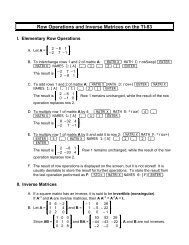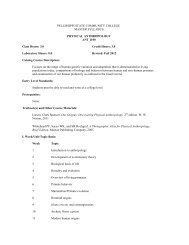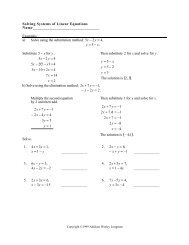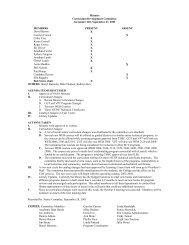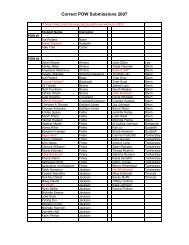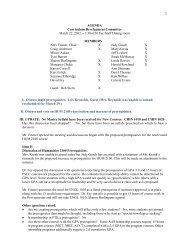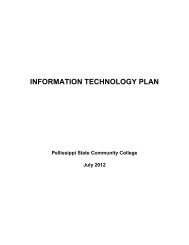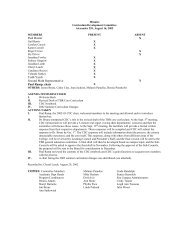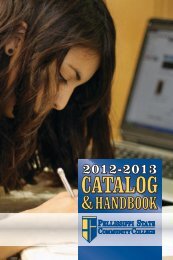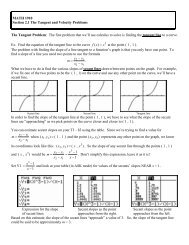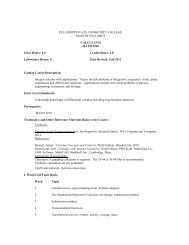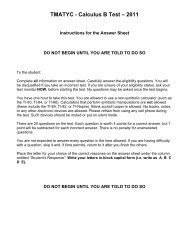Program Description - Pellissippi State Community College
Program Description - Pellissippi State Community College
Program Description - Pellissippi State Community College
Create successful ePaper yourself
Turn your PDF publications into a flip-book with our unique Google optimized e-Paper software.
◆★MATH 1130 <strong>College</strong> Algebra 3 Credits<br />
This course is designed for students who are not in University Parallel/<strong>College</strong> Transfer programs<br />
of science, mathematics, engineering, or computer science. Topics include linear, polynomial,<br />
rational, exponential, and logarithmic functions and their graphs and applications; linear<br />
and nonlinear models. Spring and Fall Prerequisite(s): High school algebra I and algebra<br />
II and ACT math score of at least 19; or DSPM 0850 or equivalent math placement score<br />
◆★MATH 1410 The Structure of the Number System 3 Credits<br />
Recommended for prospective elementary education teachers. Topics include problem solving,<br />
sets and relations, numeration systems, integers, elementary number theory, rational numbers,<br />
decimals and algebraic applications. On Demand Prerequisite(s): High school algebra I<br />
and algebra II and geometry and ACT math score of at least 19; or DSPM 0850 or equivalent<br />
math placement score<br />
◆★MATH 1420 Geometry/Statistics 3 Credits<br />
Recommended for prospective elementary education teachers. Topics include elementary<br />
probability and statistics, basic plane and 3-space geometry, congruence and similarity, constructions,<br />
transformations, area, volume, surface area and measurements. On Demand<br />
Prerequisite(s): High school algebra I and algebra II and geometry and ACT math score of at<br />
least 19; or DSPM 0850 or equivalent math placement score<br />
◆★MATH 1530 Elementary Probability & Statistics 3 Credits<br />
Topics include elementary probability theory, concepts of descriptive statistics, discrete and<br />
continuous distributions, hypothesis testing, confidence intervals, sample sizes, correlation,<br />
regression, multinominal and contingency tables. Noncalculus based. Computer applications<br />
will be investigated. Spring and Fall Prerequisite(s): High school algebra I and algebra II and<br />
ACT math score of at least 19; or DSPM 0850 or equivalent math placement score<br />
◆★MATH 1630 Finite Mathematics 3 Credits<br />
Linear functions and applications, interest, annuities, amortization, systems of linear equations,<br />
including Gauss-Jordan elimination, and matrix theory. Linear programming using<br />
graphical and simplex methods. ACT math score of at least 21 is recommended. Spring and<br />
Fall Prerequisite(s): High school algebra I and algebra II and precalculus and satisfactory<br />
placement test scores; or MATH 1130<br />
★MATH 1720 Plane Trigonometry 3 Credits<br />
Plane trigonometry, with emphasis on identities and other analytic aspects used in calculus.<br />
This course is a prerequisite for MATH 1910 if a high school trigonometry course has not been<br />
completed. On Demand Prerequisite(s): High school algebra I and algebra II and ACT math<br />
score of at least 19; or DSPM 0850 or equivalent math placement score<br />
◆★MATH 1730 Precalculus 5 Credits<br />
Precalculus for students in University Parallel/<strong>College</strong> Transfer programs of science, mathematics,<br />
engineering or computer science. This course prepares students for Calculus I.<br />
Review of algebraic, trigonometric, logarithmic and exponential functions. Topics include<br />
systems of equations and inequalities, maximization, trigonometric definitions, graphs, equations<br />
and identities, exponential and logarithmic functions and complex numbers. Spring and<br />
F a l l P re re q u i s i t e ( s ) : High school algebra I and algebra II and A C T math score of at least 19;<br />
or DSPM 0850 or equivalent math placement score<br />
◆★MATH 1830 Basic Calculus & Modeling 4 Credits<br />
Topics include differentiation and integration of polynomial, rational, exponential, and logarithmic<br />
functions and methods of numerical integration. Topics from business modeling, such<br />
as economic applications and case studies, will be explored with computer simulations, computer<br />
labs, or calculators. A graphing calculator is required. Spring and Fall Prerequisite(s):<br />
High school algebra I and algebra II and precalculus and satisfactory placement scores; or<br />
MATH 1130 or 1730<br />
◆ Meets <strong>Pellissippi</strong> <strong>State</strong> and Tennessse Board of Regents minimum degree requirements. ★ Transfers as equivalent course to the University of Tennessee, Knoxville.<br />
223



